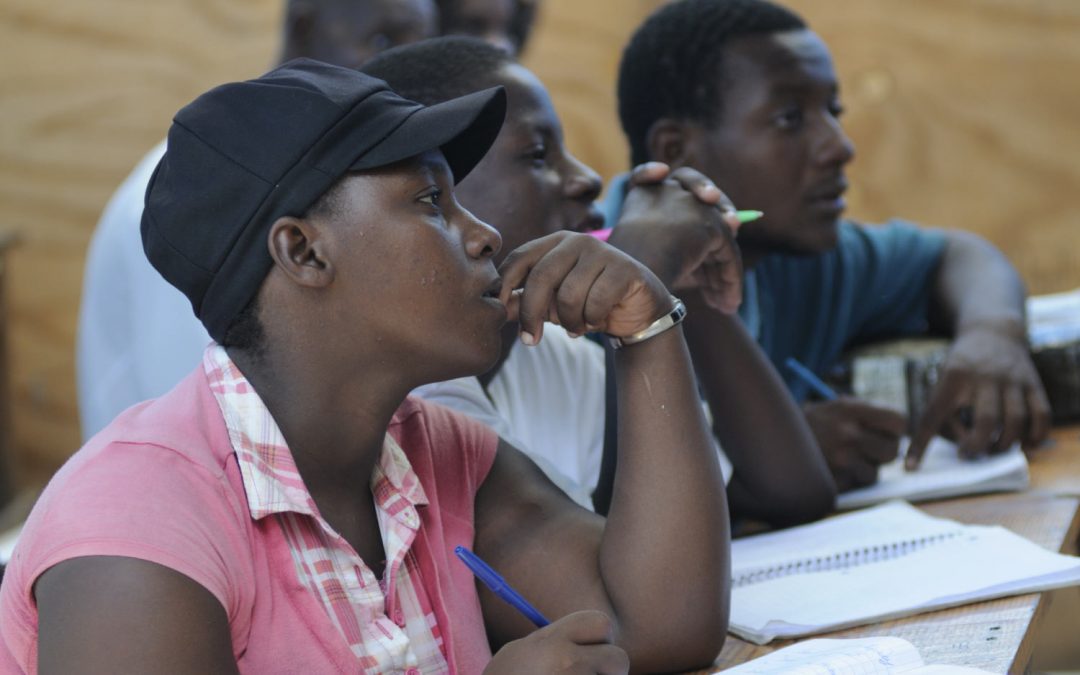Learning in a war zone – People in countries all over the world face barriers to education for different reasons. For those in war zones, there is political unrest, corruption, a lack of services and poor educational facilities. For those struck by natural disasters, there is poverty, a lack of services, among others. However, learning online is providing a lifeline for some, who are determined to educate themselves against the odds. Read how four Alison learners in Sudan, Liberia and Iraq and Haiti are overcoming the barriers to education they face by learning online.
As a result of war, life has become terrible… there is a constant economic threat, there is widespread insecurity, there are a lack of jobs and a lack of a sufficiently strong educational institutions in the country.
Alison – a Stepping Stone to a Better Life outside Liberia
Liberian Tamba Freeman lives in the south eastern part of Liberia called Greenville, Sinoe County. Tamba currently works for the United Nation’s Mission in Liberia as an administrative assistant. A trained administrator and logistician, Tamba has over 20 years’ experience working for Catholic Relief Service (CRS/Liberia) and the Medical Emergency Relief International (MERLIN/Liberia). While the country is in turmoil, Tamba dreams of a better future for him and his family, and so has been learning on Alison to upgrade his education and his chances of gaining employment in another country.
Working in the south eastern part of Liberia is challenging, says Tamba. “Prices are very high and the educational system is far below standard due to lack of qualified instructors. There is no college education for students out of high school. College education can mainly be found in the capital, leaving the other counties behind in terms of college education. Due to the lack of standards, high school and college students are not properly prepared for future career development and employment.”
High Inflation and High Unemployment in Liberia
In addition to the educational and cost issues, services are below standard, with few internet cafes and a very slow network, making communication difficult. Corruption is also a constant problem, he says.
“We are faced with bad road conditions, poor internet connectivity, both within the city centers and the rest of country. Unemployment remains high, inflation remains high. The security sector reforms also remain a challenge for the current government. Taxation is also very high and the revenue generated is misused and misappropriated by public institutions and individuals, thus affecting the development process on a large scale.”
Corruption in Liberia
“Due to the lack of job opportunity, inflation and corruption, only a few people are enjoying the country – mainly Government officials and a few others who are working with and holding senior positions with the UN and other international organisations. The dependence ratio has increased, with very few people within the working class able to afford to educate their children in foreign schools.”
Tamba says that, all in all, the majority of people are “very disappointed” in the current government due to the lack of job opportunity, inflation and corruption, and are all “praying for a change in leadership”.
“Until we can have a change in leadership and a change of attitude and minds, a good future still seems to be far away for my country.”
He says that nepotism also remains a challenging force in the country, resulting in one group having a much better quality of life than the majority of Liberians.
“For better change, it takes the will of the people to determine a definite course of action through a peaceful political determination leading to better selection of public figures with credible image both from abroad and back home. This will make Liberia a better place to live and invest in, considering the wealth of natural resources available for a country with a population of three million inhabitants.”
Lack of Quality Education in Liberia
Despite the challenges Tamba and his country face, he is currently working hard to obtain an international position within the United Nations outside of Liberia.
“This would afford me the opportunity of achieving my dreams as an international civil servant, affording my children better quality college education outside of Liberia. Quality college education in my country still remains challenging, thus rendering our standards far below other African countries.”
Currently working on four diploma courses with Alison, Tamba says learning online with the free education platform has improved his prospects of realising his dream.
“Alison has improved my professional experience and prospects of obtaining a better and higher position in the areas of administration and logistics for future employment. I am currently working on my last four diploma courses with Alison.”
Incomes have increased from around US$10 per month to approximately US $400 a month and Iraqis can now can buy furniture, cars, build houses and travel, but there are still many challenges.
Corruption in Iraq – the Challenges
Ali Al-Sarraf, who lives in Southern Iraq, works as an administrative employee in an international foundation. He has been studying on Alison for some time, improving his human resources skills and learning English. He believes it has benefited his career greatly and given him more opportunities in a country where there are still many challenges.
Ali, who is 33, and married with three children, says that, while things are stable for him and his family, it’s a different story for many others in the country. Life is better in Iraq now than before 2003, he says, but more improvements are needed, particularly with regards to security and services.
“Incomes have increased from around US$10 per month to approximately US $400 a month and Iraqis can now can buy furniture, cars, build houses and travel, but there are still many challenges. Corruption is considered to be the number one problem because other countries and organisations gave a lot of money to Iraq for its reconstruction, but corruption has led to the failure of this being done. With regards to my city, the security situation is OK, but in other cities in Western Iraq there are bombs, terrorism and kidnappings. Services are poor throughout the country, especially with regards to electricity, drinking water, roads and the health system.
Frustration with Government in Iraq
The challenges faced by the country change from region to region, with some areas faring much better than others, he says.
“For example, in North Iraq (Kurdish area), employment is good because of good security and more stability. Also in southern Iraq (Basra), there are many oil companies, so there are many jobs. But in other cities, like middle Iraq, there are few jobs.”
Ali says that many people are frustrated and unsatisfied with government performance and are looking forward to a better future. From Ali’s perspective, he would like to see peace reigning and an end to the corruption that has plagued the country.
Alison, he says, has improved his skills, particularly in relation to HR, company administration and English. Studying on Alison has also made him behave more professionally with his co-workers, he feels.
Education Crisis In Haiti
While not a war zone, Haiti has faced its own challenges in recent years – political unrest, social unrest and natural disasters. These have posed a number of barriers to education.
Samuel Albert, who lives in the Dominican Republic, grew up in Haiti, and remembers a wonderful, carefree and happy childhood. While he has been forced to leave formal education due to financial pressures, he has been using ALISON to fill the gaps in his education.
“It was fun when I was younger. I enjoyed my childhood – going to school every morning with a group of fellow students, having fun all the way to school. At school, there was an atmosphere of respect. Teachers were very concerned about our education, our parents were very happy for us to go to school, always wanting to make sure that we got to the next grade every year.”
However, when political and social unrest began to take hold in Haiti, things changed for Samuel and his fellow countrymen and women.
“After I graduated from high school, the problems started. There was no more childhood, the country was no longer in peace and there were political problems all the time. Young university students were dying all the time.”
Fierce Competition for University Places in the Dominican Republic
While Samuel was determined to continue with his studies, competition for college places is fierce, with many colleges holding competitions where only the highest achieving students secure a place at college, leaving the majority of would-be students left behind.
“So I had to make another choice, which was go to a professional institute. My dad suggested that I go to one of the best professional institutes in the country. He was ready to pay for the two-year electronic engineering course, but it was the same thing here – a competition to get in. I actually won the seventh place in the competition, but, because I was a couple of hours late to pay the fee, unfortunately I lost my place.”
And so, following this disappointment, Samuel moved to the Dominican Republic to continue with his studies.
Unfortunately, the cost of continuing to keep Samuel at university was too much for his father to bear and so Samuel was forced to give up his university place and find a job.
“I have been living in the Dominican Republic since, working to take care of myself and hoping to go back to the university to continue my career. Since I left, I have been taking courses on Alison and wish to make the most of them that I can. Things in the Dominican Republic were good when I started to work first, but as time has gone on, we now don’t have the same peace as Haiti. They have literally asked us to leave, so now I am now living in an unpeaceful atmosphere, and will be forced to leave the country as soon as possible.”
*Names have been changed to protect the identity of the Alison learners in this article.








